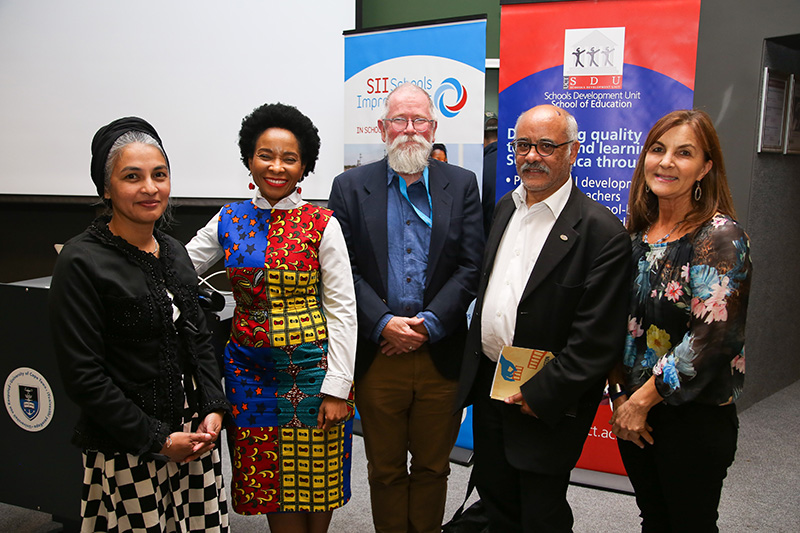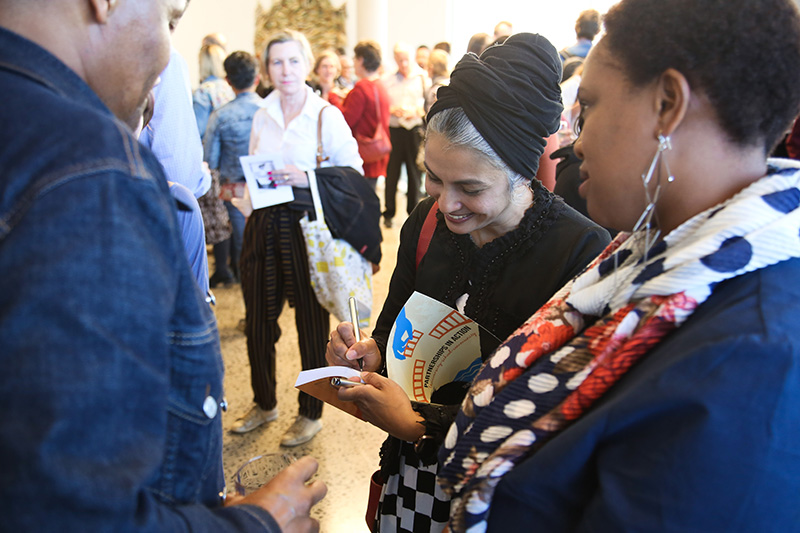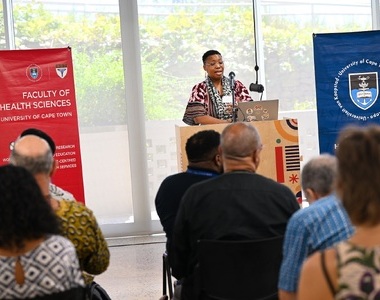Book documents SII schools empowerment strategy
04 December 2018 | Story Kim Cloete. Photos Je’nine May. Read time 8 min.
School principals and teachers from across Khayelitsha joined University of Cape Town (UCT) academics spanning faculties and departments to celebrate the launch of the book Partnerships in Action, which tells the story of UCT’s Schools Improvement Initiative (SII).
The book documents the work of the SII, which was set up by UCT as a multi-stakeholder approach to dealing with the challenge of poor performance by learners from under-resourced township schools.
From its early roots in 2011, it has grown into a wide-ranging programme, with academics and students from different departments working with principals, teachers and learners at all of the 20 high schools in Khayelitsha, as well as some primary schools.
Jonathan Clark, director of the SII and one of three co-authors of the book, said Partnerships in Action focuses on the SII’s unique interdisciplinary work and engagement with the community.
The book launch at the New Lecture Theatre at UCT on 28 November was a celebration of the close ties that have developed between UCT and the primary and secondary schools in Khayelitsha, as well as other partners. These include the Western Cape Education Department, The Bookery, which supports school libraries, the Rotary service organisation, and Nal’ibali, a reading-for-enjoyment campaign.
From one school alone, 18 teachers and their principal poured into the lecture hall, brimming with energy and enthusiasm.
Vice-Chancellor Professor Mamokgethi Phakeng stressed at the event how important it is for the university to work with partners within the community.
“The book we are celebrating demonstrates this truth: The university does not stand alone. In fact, it cannot stand alone if the university is to be relevant in today’s world.
Partners in change
“Such partners don’t just receive what the university provides; they participate in the solutions that they have helped to formulate. They become the change they want to see.”

Phakeng said that in the past higher learning institutions such as UCT tended to take the view that problems in schooling were not theirs to fix.
“This view is directly contrary to the critical role the university can play in addressing systemic problems in the community.”
“What we are trying to do is to cut across the divisions, to harness the resources and expertise of different departments and collaborate with each other.”
The SII is a UCT Strategic Initiative intended to strengthen the capacity of the Schools Development Unit in the School of Education to respond more effectively to the crisis in education in this country. It offers a range of support to the partner schools, from working with teachers and principals to helping to develop libraries and supporting library assistants.
A vital part of the initiative is that fourth-year occupational therapy, speech and language therapy, and audiology students do practical work at the partner schools.
Student teachers also assist the learners, while Ubunye and the Students Health and Welfare Centres Organisation (SHAWCO) are both involved as well.
The initiative has recently expanded to include third- and fourth-year social work students, who offer psychosocial support to learners at the Centre of Science and Technology (COSAT) Wellness Centre.
Breaking through academic silos
The book documents how the work of the SII has broken through academic silos, and offers insights into how this is done.
“Faculties and departments generally work in isolation from each other. What we are trying to do is to cut across the divisions, to harness the resources and expertise of different departments and collaborate with each other,” said co-author Dr Patti Silbert, who is the project manager for SII.
“It’s permeating in a radical way across departments – right across the university,” she added.
The book examines how the work goes beyond the practical elements into deep and scholarly research that spans the Humanities and Health Sciences faculties and departments, including UCT’s Library and Information Studies Centre.
For co-author Professor Roshan Galvaan, head of Occupational Therapy at UCT, the SII holds valuable lessons for academics.

“The emphasis is on the shifts in thinking that we have been able to bring about with children we have worked with, the changes that the teachers have demonstrated, and what we have learnt about the contributions our professions can bring.”
She said the SII has created an opportunity to see how to work differently.
“What we have done is reposition occupational therapy to see how it responds to contextual challenges we face in South Africa.”
She cited the example of how students have gone beyond working with individual children who battle with fine motor skills and have difficulty with handwriting.
“This is an individual problem, but it could also be because of lack of access to opportunities. We are looking at how we can collaborate with teachers to put in place aspects within the classroom that can bring about change.”
“Today, Khayelitsha is at UCT. Khayelitsha is no longer outside of UCT, and it is embodied in these young people being here at the university.”
Reflecting on early beginnings
Many of the people who gathered for the function were pleased to see Professor Crain Soudien, chief executive officer of the Human Sciences Research Council (HSRC), return to UCT to speak at the launch. He was a deputy vice-chancellor at the university until late 2015.
Clark said Soudien had been instrumental at the beginning of the SII’s journey.
“His wise counsel put us firmly on the path towards strong, responsive partnerships.”
Soudien, who wrote the foreword to the book, reflected on the early beginnings of the SII. He told of negotiations with the Khayelitsha Development Forum, which gave its blessing to the project.
He spoke of how revealing it had been chatting to young people in Khayelitsha when the project was first being developed.
“I asked them whether they would like to come to the university one day. At that point, young people had no sense of that, even as a possibility.”
For many, not least Soudien, it has been heartening to see how the relationship forged between the community and UCT has unfolded. This has been evidenced through the SII’s 100UP programme, which prepares learners for university.
“Today, Khayelitsha is at UCT. Khayelitsha is no longer outside of UCT, and it is embodied in these young people being here at the university.”
Every year a new group of 100 grade 10s are recruited onto the SII’s 100UP programme, five learners from each of the 20 secondary schools in Khayelitsha. Since 2014, over 700 learners have been helped to secure university placements in South Africa, with nearly 250 enrolling at UCT.
Soudien said the SII needed to combine what it had learnt alongside a new learning about inequality.
“Working with these incredible young people, we have a major opportunity. We can teach the world new things. We can help people understand what the possibilities are in those spaces.”
Partnerships in Action can be purchased at the UCT Campus Store (Protea bookshop), at all good bookstores or online.
 This work is licensed under a Creative Commons Attribution-NoDerivatives 4.0 International License.
This work is licensed under a Creative Commons Attribution-NoDerivatives 4.0 International License.
Please view the republishing articles page for more information.






























































































































































































































































































































































































































































